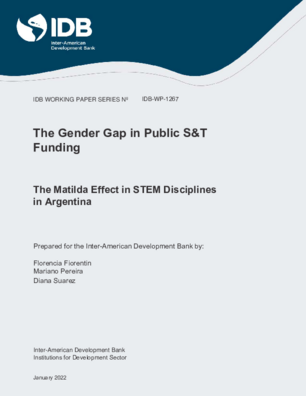The Gender Gap in Public S&T Funding: The Matilda Effect in STEM Disciplines in Argentina
Date
Jan 2022
This study explores the presence of gender bias in public grants for science and technology (S&T) activities known as the Matilda effect in STEM disciplines (science, technology, engineering, and mathematics) in Argentina. The empirical analysis is based on the Scientific and Technological Research Projects program (PICT in Spanish) for the period 20032015 and found that female researchers are less likely to be awarded the first time they apply for a research grant than their male counterparts (-6.2 percentage points, or p.p.). Even for follow-on applications after the first one, without having been awarded before, female researchers remain less likely to be awarded (-3.8 p.p.). However, the probability of being recurrently awarded known as the Matthew effect is the same for both male and female researchers. This paper concludes that female researchers in STEM suffer disadvantages in the allocation of public funds to finance their research projects. Only those female researchers that overcome the initial barriers and obtain their first grant can take advantage, as their male counterparts do, of the Matthew effect that makes them more likely to obtain further awards. These results suggest the need for policies aiming at reducing the initial gender gap in accessing public grants for female researchers in STEM.




